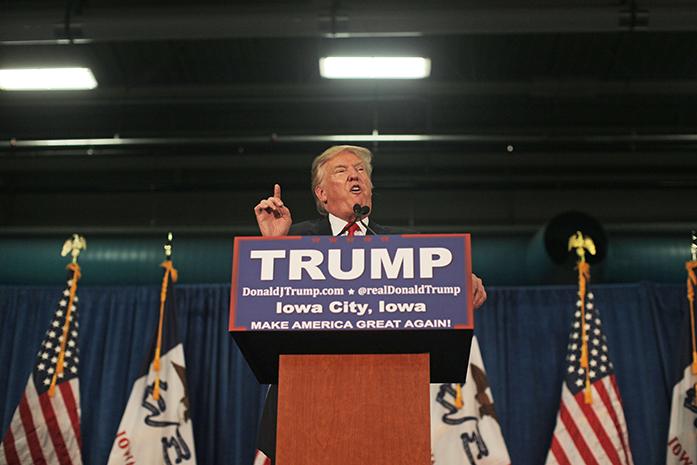Donald Trump is triumphant because he a superb actor and understands American cultural history. The secret of Trump’s success as a politician: His racist expressions are disingenuous, reflecting his tapping into the anger of the white middle/working class rebelling against what John Higgs in Stranger Than We Can Imagine (2015) calls Neoliberalism and the fact that white lives have not mattered since the Reaganomics of the 1980s.
Trump isn’t an ignorant man. He attended Penn’s Wharton School, the oldest business school in the U.S., and he knows how to use case-studies. His favorite case-study: Benito Mussolini, whom he quotes. Historians and political scientists relate that Mussolini had a strong political personality like Trump.
Konrad Jarausch writes in Out of Ashes (2015): “A postwar police report police report described [Mussolini] as “an emotional, impulsive person, a good speaker” who was “very intelligent, shrewd, cautious, and thoughtful, with a good understanding of men.” The Duce/Trumpism also reveled in raucous mass meetings shouting down his opponents, haranguing his followers with slogans, dramatized by exaggerated gestures.”
Trump supporters long for authoritarianism
Reo Christenson writes in Ideologies & Modern Politics (1971): “[Mussolini], the man who brought fascism to Italy, has been called many things — opportunist, extremist, cynic, rebel, demagogue, egotist, bellicose, cunning — and perhaps he was all of these if not more.”
Christenson credits Seymour Martin Lipset for his exegesis of the voters projected as Trump supporters. Lipset posits that the lower classes have a basic predisposition toward authoritarianism, a kind of latent congeniality toward totalitarian values. Lower classes are not completely devoid of all liberalism, but closer inspection reveals that such liberalism is primarily economic. The lack of educational attainment that typifies lower-class standing means an outlook of narrow dimensions (thinking in “either-or” terms), a preference for “action” rather than “verbalization,” and uncomplicated answers. Lower-class individuals are discouraged from political disposition involvement and withdraw in the form of nonvoting. Trump admits to “loving” the uneducated.
Middle-class lifestyles seem conspicuously different from the impoverishment of the lower educational and economics that a parallel link with authoritarianism would appear remote. Yet the middle class carried Hitler and the Nazis into power, while the upper classes remained at arm’s length until Nazism was a fait accompli.
As in the 20th century, the middle class finds itself in a psychological “squeeze,” “caught” in the middle. Coupled with the fact, as today the middle-class, the power that dominated the years prior to the 1980s, now finds its political and social fortunes declining.
The crisis of the middle class can be described as increasing isolation: insecurity in the face of new rivals/immigrants. Out of this anxiety comes the quest for some political program that promises to restore lost/losing glories. It’s this development, which sealed the bargain between the middle classes and non-communist authoritarianism leadership of Trump.
The Trump appeal
The greatest appeal of Trump to his supporters is his wealth. Jane Mayer in Dark Money (2015): Only two Republican candidates who wouldn’t toe the Koch’s line: Donald Trump and John Kasich. Mayer writes: “Donald Trump, New York real-estate and casino magnate whose unorthodox bid for the Republican nomination flummoxed party regulars, was left off the Koch’s’ invitation list.”
Trump’s popularity suggested that voters were hungry for independent candidates who wouldn’t spout the donors’ lines [like Mitt Romney and John McCain]. His call to close the carried-interest tax loophole and talk of ultra-rich not paying its share, as well as his anti-immigrant rants, made his opponents appear robotically subservient and out of touch. But few other Republican candidates could afford to ignore the Kochs.
However, Matt Isaacs in the March/April Mother Jones writes in “Sheldon Adelson Goes All In”: “Presidential hopefuls have made sure to be on billionaire Sheldon Adelson’s radar; in December, when they all appeared onstage at his Venetian resort for a prime-time debate — even Donald Trump, who swore off contributions from his fellow billionaires, sent Adelson a glossy booklet of photographs from a gala where he accepted an award for boosting U.S.-Israel relations. ‘Sheldon,’ the candidate scrawled across the cover, ‘no one will be a bigger friend to Israel than me.’ (Adelson has promised to support whoever wins the nomination.)”
Making America great again
More pertinent to Trump’s political role-play is his case-study of George Wallace. Michael Farquhar in Bad Days in History (2015): Well before he became the very embodiment of the fierce racial segregationist, George Wallace was a much more moderate man. “If I didn’t have what it took to treat a man fair, regardless of his color, then I don’t’ have what it takes to be the governor of your great state,” he declared during the Alabama gubernatorial campaign of 1958.
Wallace decisively lost that race to bile-spewing, Klan-backed opponent John Patterson. It was a bitter experience for the ambitious politician who had vowed at age 14 that he would one day head the state.
Out of the wreckage of his 1958 campaign — backed by the NAACP — Wallace reinvented himself as a fire-breathing segregationist.
Having “made a Faustian bargain,” as his biographer, Dan Carter, described the tawdry transformation in the Huntsville Times, and “sold his soul to the devil on race,” Wallace won his long-coveted place in the governor’s mansion.
On Jan. 14, 1963, Wallace delivered the inauguration speech that would forever define him:
… In the name of the greatest people that have ever trod this earth, I draw the line in the dust and toss the gauntlet before the feet of tyranny, and I say segregation now, segregation tomorrow, segregation forever.”
Mary Gravitt






